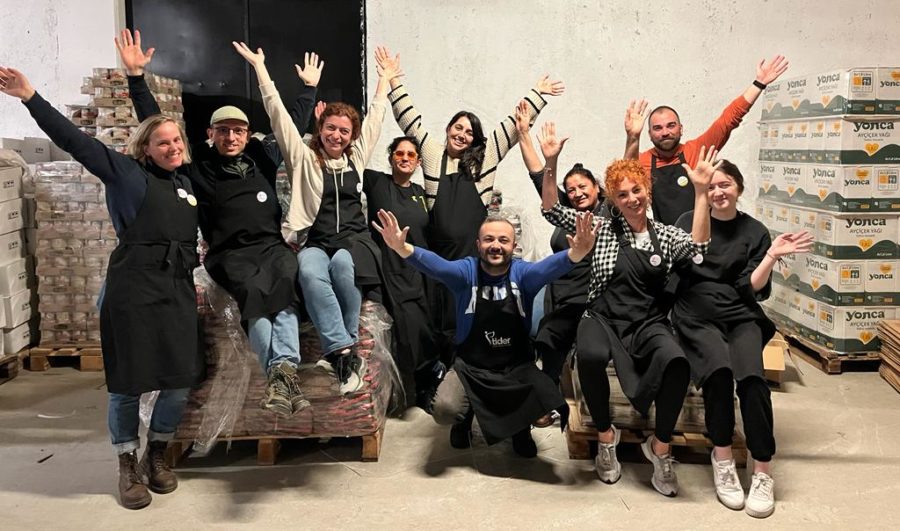
The Basic Needs Association (Temel İhtiyaç Derneği – TİDER) is actively working to prevent food waste in Türkiye through the network of food banks it supports. TİDER also contributes to the widespread adoption of a different model of solidarity by supporting disadvantaged groups to benefit from these food banks.
TİDER is receiving grant support from our Kahramanmaras Earthquake Emergency Relief Fund, launched in collaboration with the Support Foundation for Civil Society (Sivil Toplum için Destek Vakfı). The organisation is identifying the needs and capacities of food banks in Adana, Adıyaman, Gaziantep, Hatay, Osmaniye, and Şanlıurfa, and supporting these food banks by meeting their needs.
Please read the following interview with the organisation for an insight into their work and the impact of their initiatives.
For our readers who are meeting your association for the first time, can you briefly tell us the history of the Basic Needs Association (Temel İhtiyaç Derneği – TİDER) and its work?
Food waste is a significant problem in Turkey, estimated at around 18 million tonnes out of a global figure of around 1.3 billion tonnes.
Food banking systems aim to collect surplus food and distribute it to people in need. This is how it works: We collect surplus items and distribute them free of charge to those in need through food banks in the form of markets, soup kitchens, or warehouses. This process can be thought of as supply chain management, where we work with major brands to source items and distribute them to food banks. These food banks are usually run by municipalities, local governments, or local civil society organisations (CSOs) and are growing in number across the country.
Municipalities or CSOs wishing to participate in food banking contact us, expressing their interest. Through mutual agreements, these organisations commit to distributing the products in a structured manner. Once the appropriate infrastructure is in place, we provide food support to these organisations. This process is based on a simple protocol, and we focus solely on providing the necessary training for efficient implementation, without interfering with management structures.
You are implementing the Earthquake Support project with the support of our Kahramanmaraş Earthquake Emergency Relief Fund. As your project is nearing completion, can you tell us about its activities and results?
Immediately after the earthquakes, we took action to provide support. We used the grants we received to purchase food and distribute it through food banks to those affected by the earthquakes. Additionally, we established a new food bank in Adıyaman.
We identified the needs of 11 food banks in Adana, Hatay, Malatya, Gaziantep, Şanlıurfa, Osmaniye, and Adıyaman, and prepared a project to meet these needs. Currently, we are in the process of addressing the needs identified during the field visits. Another aim of the project is to create employment opportunities. Thus, we aimed to contribute to the economic development of the people living in the earthquake zone and create job opportunities.
We established a new food bank in Adıyaman. Here we support the participation of local people in employment and contribute to the economic empowerment of individuals.
Global food waste is at a critical point. In collaboration with food banks, what kind of emergency management plan should be put in place to be prepared for emergencies? Given the activities you’ve carried out in the project, what can we expect in the future for emergencies?
As the ninth member of the Disaster Platform (Afet Platformu), we added a provision to our protocol regarding the use of food banks and TİDER warehouses during disasters. This allows, for example, a warehouse in Ankara to be used as a safe and secure place for many municipalities and food banks to store and distribute aid.
The first 72 hours of a disaster are critical. During this period, the first step is usually to set up a relief warehouse. This is why we recommend that municipalities organise their warehouses for disasters. Because the safe storage of relief supplies is crucial in a disaster.
As the Disaster Platform, we plan to build the warehouse of our dreams by applying for a European Union project. Also, we are trying to involve food banks more effectively in disaster situations by updating our protocols.
Can you tell us about the goals and future projects of TIDER? How does our grant support influence your future goals and projects?
This project brings together CSOs, supporters, and donors with a common vision, embodying an approach that aims to uplift people. Alongside our employment-focused efforts, we aim to have a positive impact not only on the lives of individuals, but also on societal dynamics through activities in various areas such as education and the establishment of cooperatives. Within this framework, we are developing projects that will contribute to the self-reliance of individuals and ensure the continuity of our development efforts.
In our efforts to combat waste, we emphasise the critical role that newly enacted laws will play in protecting donors and supporting organisations. As a developing country, we have and will continue to focus on sustainable and innovative agricultural projects to prevent waste in agricultural, logistical, and storage processes. Our goal of establishing a food bank in every district across the country highlights the fact that waste is everywhere.
We recognise that food and shelter are the first steps to development. As a food bank, we focus on these needs as the foundation for sustainable development and strive to achieve this goal with the contributions of our donors and supporting organisations. Without these resources, it would not be possible to donate products that would otherwise go to waste. The projects that the Food Bank supports with this belief continue to make a difference in society.



